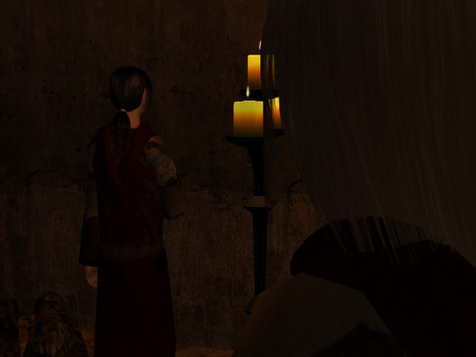
Paul found his father where Alred had said he would be, and doing precisely what Paul had known he would be doing: in the gloomy old barn that had never belonged to a farm, staring at a blank wall – the blanker the better.
“May the wind lift you up, my father,” he murmured.
It was a strange formality for the two of them, but his father seemed almost a stranger to him this morning. Paul did not know quite whom he was meeting; and though Flann and his father were only said to be “visiting” at Nothelm, Paul had already come to understand that they would be living with him no more.
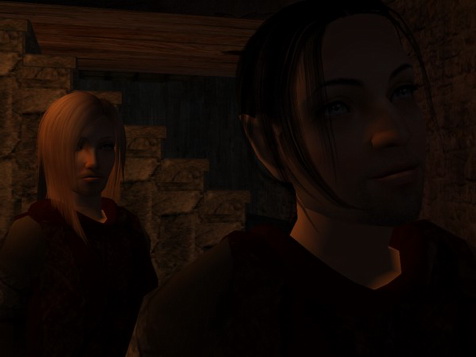
“May the sun shine upon your face, my son,” his father replied.
He passed his hand lightly down the wall before turning to Paul, smiling strangely – like a stranger.
“Did Flann tell you I was here?” he asked.
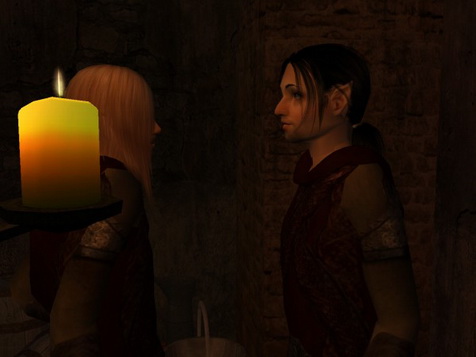
“I only talked to Alred and the Old Man. Flann was with the ladies. I sent Cat and the girls in to join the gossip,” he added with a faint, fond smile.
“The ladies…” his father sighed. He turned back to the wall and stroked his hand down over a stain. “Now Flann is a lady.”
“What was she before?” Paul tried to joke. “A gentleman?”
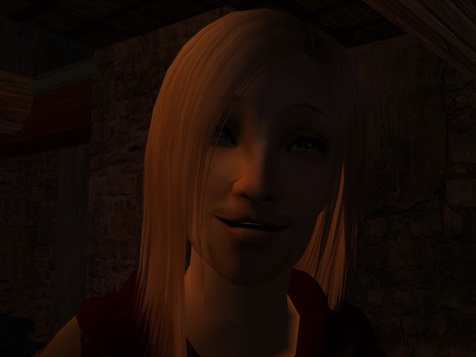
“I wonder…” his father muttered. “She must have been something strange, if two days ago she could not have been with the ladies, and now she may, merely because I married her.”
“That is how the men see things,” Paul shrugged. “If it matters, I think Alred and Hetty would have received her, if not for their girls.”
“Hmm. Because young girls are so innocent.”
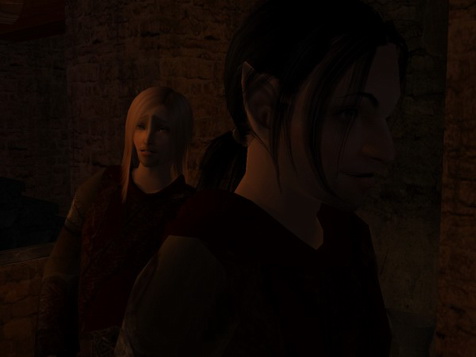
“I suppose so…” Paul said uneasily, for he thought his father was leading him into some sort of rhetorical trap.
His father turned to him again and clasped his hands behind his back. “Then I wonder why they blame the innocent girls when a wicked man takes advantage of their innocence?”
“I think they do,” Paul said warily. “But if you’re speaking of Flann, they never found the man to blame.”
Paul was trying to lay a trap of his own. He believed his father knew who had taken advantage of Flann’s innocence, and he was more anxious than ever to find out.
But his father merely lifted his head and said, “I think her too fine for them now, if she is a finer lady than she was before. I did nothing to make her so. But if she thinks them good enough for her…”
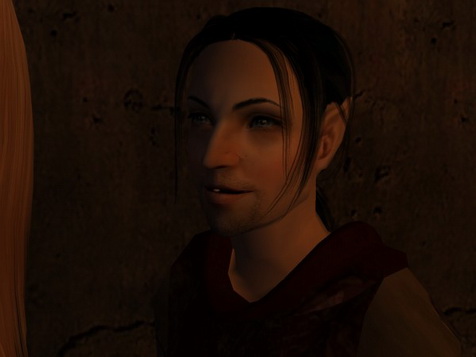
Paul nodded vaguely, but he scarcely knew to what he was agreeing. Now that his father’s chin was well raised into the candlelight, there could be no doubt: his cheeks were clean-shaven, and there was a several days’ stubble on his chin. His father was growing a beard.
After a moment his father seemed to notice Paul’s eyes were not quite looking into his, for he whipped his head around and pulled Paul beside him to stare at the wall.
“What do you think, my son? Can we hope at least to make this place good enough for her?”
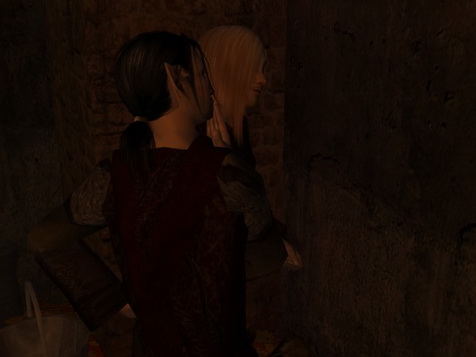
Paul sighed and tipped his head back to look up at the rafters. It was like his father when speaking of a building to turn all his attention to the walls.
In fact, Paul did not think the empty old tithe barn fine enough for either of them, but one or both of them seemed so eager to be living anywhere else that any roofed and walled structure of sufficient size would have done. Cat blamed his father. Paul blamed Flann.
“I suppose that is a No,” his father said.
“Why don’t you build a new house?” Paul whined. “What’s your hurry?”
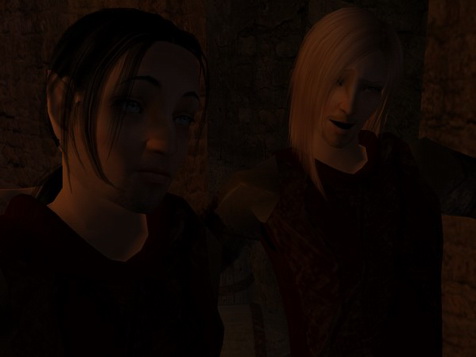
“This is a solid building, Paul.” He pounded his fist a few times lightly against the plaster. “Stone and brick. That takes a long time.”
“If stone and damp is what you want,” Paul said sarcastically, “I know a very nice cave.”
His father raised his fist like a hammer and slammed it against the wall, so furiously Paul was startled into gasping as if he himself had been struck.
“Solid!” his father cried. “That’s what I need. I told Flann it was a pity there were no windows on this side, and she said it was a fine thing: she wouldn’t have to worry about anyone creeping in through them while she sleeps. That’s what I have to consider!”
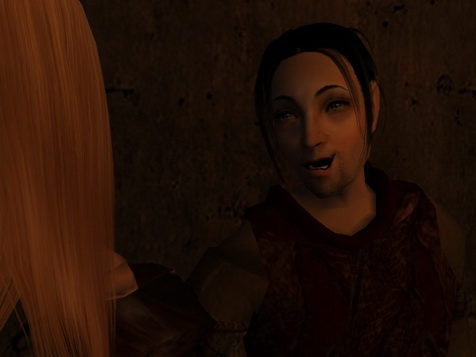
“I have to consider that, too,” Paul mumbled. “We might have considered it together.”
“I apologize to you and Cat and our family, but Flann won’t sleep in that house again. I won’t ask her to, after all she suffered there while we slept. And after you put that Sebastien in her own bed!”
“It was Cat’s idea,” Paul growled.
His father had begun to turn away, but something in that voice stopped him. Paul was not blaming his wife but giving her credit.
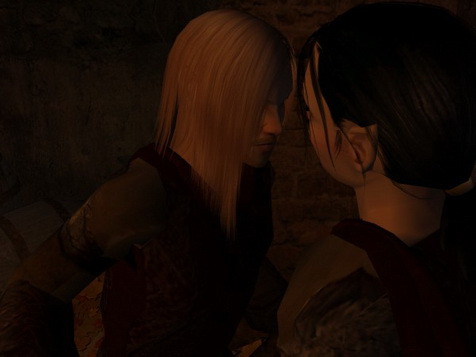
“In her country they honor the dead as guests and show them every courtesy. Even strangers, my father. Even enemies.”
His father snorted. “Flann is from her country, and nevertheless I do not think she would like to know that Sebastien was in her bed, in her little room, where she cried so often.” He turned back to the wall and picked at the flaking edge of a crack in the plaster. “Even dead,” he added.
Paul could scarcely believe what he was hearing. “Haven’t you told her?” he gasped.
His father pushed himself away from the wall and nearly into Paul.
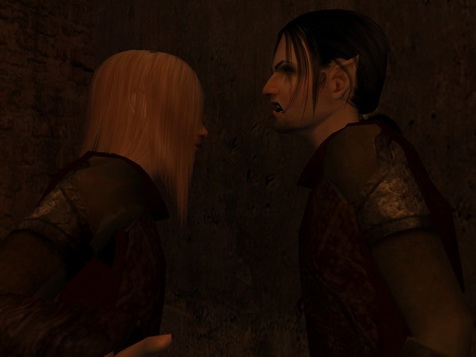
“Of course I have told her! Do you think me such a coward, or so cruel to leave her to find out some other way? I saw no reason to tell her you put him in her bed – but I told her.”
He turned hastily and ran the flat of his hand down the wall, as if he might have frightened it with his outburst, and gently over the crack, as if he could smooth the wound away.
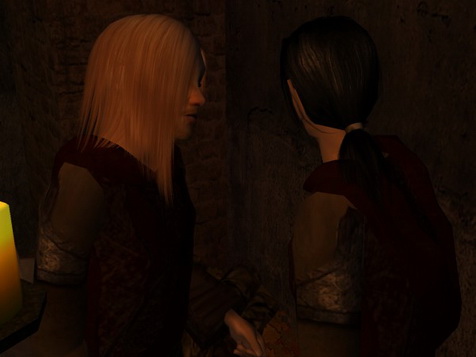
“What did you tell her?” Paul asked awkwardly.
“I told her what I told you: that he was a cruel, selfish man who saw he could not have her, and so he tried to make his mark on her by hurting her as much as he could instead. And I told her she need feel no guilt on his account.”
Paul hesitated, and again his father held his eyes for a moment before turning suddenly away.
“Will you help me to make the plaster dry? This will be the bedroom. And if she has no windows to see the forest outside, I shall paint her another inside.”
Paul sighed. “Are you in such a hurry you can’t wait for plaster to dry?”
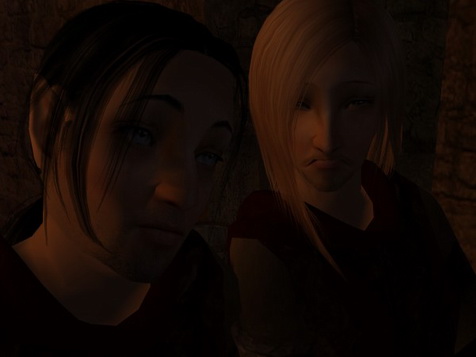
His father brushed his fingertips in fringes over the dirty walls, perhaps tracing the branches of trees he already saw there.
“You will understand when you have spoken to Flann,” he murmured. “She woke me in the night because she could not wait to tell me where she wanted to move her kitchen table, which has not yet even been made. I have never seen her so excited about anything.” He paused and pressed both palms against the wall. “I have never seen her making happy plans for anything,” he said hoarsely. “Never, never. Not for her baby. Not for her wedding. Last night she was looking at cloth with Hetty to make a big spread for our bed and a tiny one to match for Liadan’s – not gray!”
“Cat will be glad to hear that,” Paul said softly.
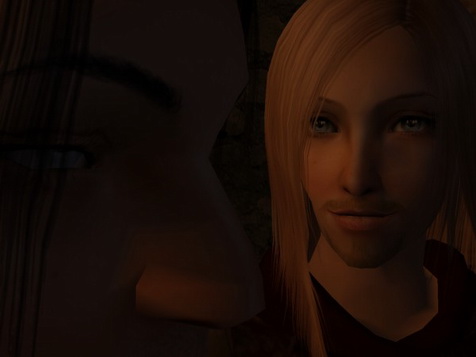
“That is why I hurry,” his father muttered.
“I see.”
“No, you do not see. You see a dark wall. You see an old barn. You see what is. I see what will be.” He slid his hands up the wall almost sensually. “After so many years of looking at what was…”
His father seemed to be speaking to the wall, and speaking as if he and the wall were alone. Paul wrinkled his nose and took a step back.
His father looked over his shoulder at him and said coldly, “I am not bound to her, Paul. Does that answer the question you seem so afraid to ask?”
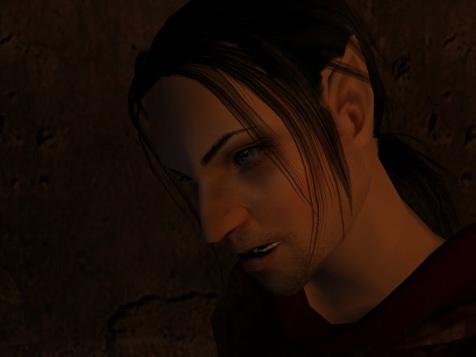
Paul gasped. That was not at all what he had been afraid to ask; after what had happened to his father the first night, he had not even thought the question remained. Whether there was something in their natures that prevented it, or whether there was a bodily reason for the ancient ban on taking a second wife when the first had been violently killed, it had seemed self-evident to Paul and Lasrua that the experiment would not be attempted again.
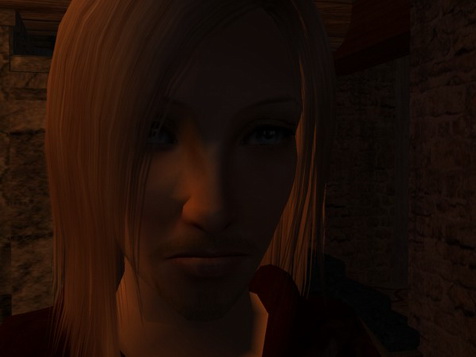
“Is that what you and your sister wanted to know?” his father hissed. “No, I am not. I lay with her as if she were no more than some kisór slut, but she is my wife, and you shall treat her so.”
Paul whispered, “Of course…”
His father blinked furiously a few times before squeezing his eyes shut and falling heavily against the wall.
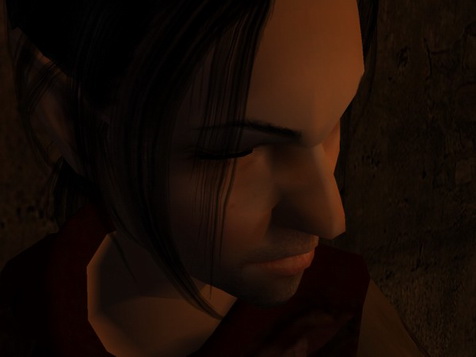
“I never meant to ask you that…” Paul said.
His father sighed and collapsed still flatter against the wall. “What, then? Why are you looking me so?”
“Looking at you how?” Paul asked stupidly, like a little boy.
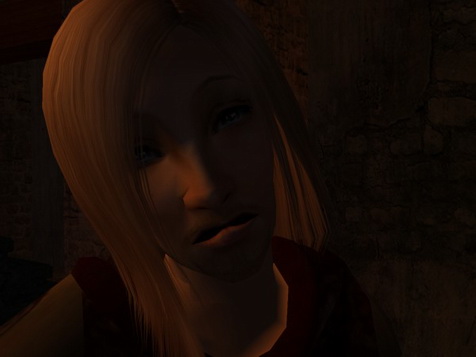
“Looking as if you had a question you were afraid to ask me.” He opened his eyes and stared blearily at Paul for a moment before letting them fall closed again. “Ask me. Whatever it is, I’m not likely to react worse than I just did.” His half-smile seemed faintly wry.
“Well…” Paul said, heartened by the half-smile as the little boy would have been. “It was about Sebastien.”
His father rocked his head back until it bumped against the wall. “Oh, sweet Mother,” he sighed. “Don’t make me prove myself wrong.”
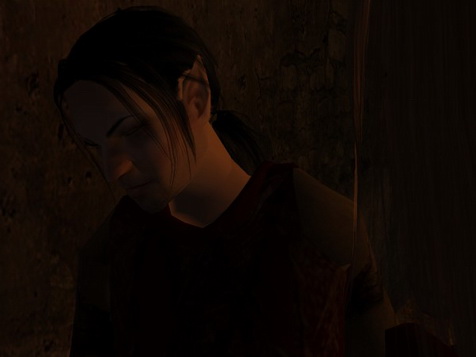
Paul could hesitate no longer. He had waited a day and a half to be alone with his father, and he did not know when he would have such a chance again.
“Do you truly believe he was only a man?”
His father pushed himself away from the wall and stood tall. When he chose, his father could still stand taller than he. When he chose, his father could still be that great lord he had once been, second only to the Khór.
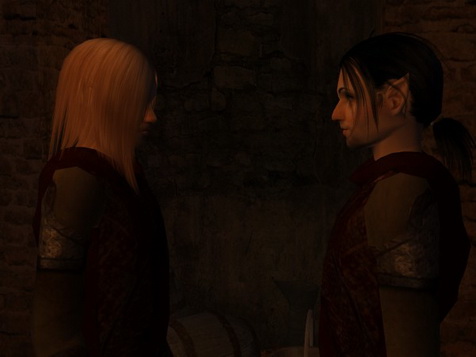
“The Abbot says he was,” his father said coolly, as though there were nothing more to be said.
Nevertheless, Paul knew that his father did not consider the Abbot a final authority, and therefore there was.
“I know, but there was something strange about him…”
“Of course he was strange–he was either mad or extraordinarily cruel to my wife, and I am grateful he killed himself and saved me the trouble. But he was not a demon merely because a demon says he was. When the Abbot says he was not.”
“I didn’t say he was a demon…”
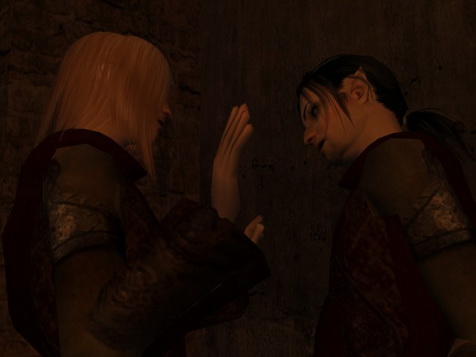
“Then say what you are trying to say, Paul! Say it, so that I may need speak that name no more.”
“I don’t know what he was or wasn’t, Father, but he had… light nature,” Paul whispered. “Like Liadan.”
He watched closely for a reaction, but aside from a slight flaring of his nostrils – which might have been no more than a trick of the candlelight – his father’s face was as immobile as a plaster mask.
“And did you ever notice that his eyes were the same color as hers?”
“He was not her father, Paul.”
His father’s growl sounded like the last warning of a wolf about to lunge, but Paul knew now he would never be allowed to even mention the subject again. He would have to press on.
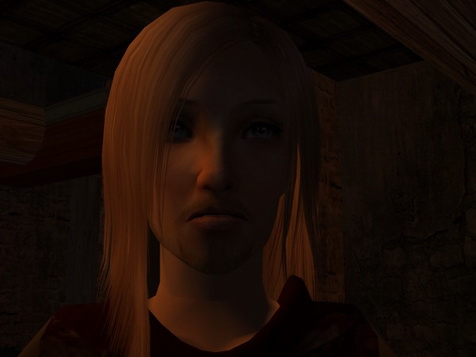
“Are you certain?” he asked.
“Sebastien was not her father. I know who was, and it was not he. He might have noticed the color of her eyes, and he might have tried to trick Flann with it, but it certainly was not he.”
“But they had the same nature!” Paul whispered, hoping that by speaking softly he would be allowed to speak longer.
“Nush and I have the same nature, but it does not mean Nush is your father.”
“That sort of reply is unworthy of you, my father,” Paul said coldly.
His father lifted his head. “I asked you to say what you wanted to say. Sebastien was not Liadan’s father. If you have anything else to tell me, tell it to me, but stop trying to lead me into saying it for you.”
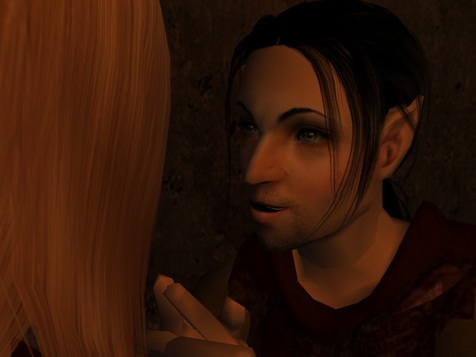
“But I don’t know what I want to say,” Paul pleaded. “I am trying to understand! I touched him for a moment, and I saw his nature was like Liadan’s. And Father Brude said something to me once about her nature, and I am trying to understand what it meant. He was supposed to tell me when he returned, but he never did.”
At last Paul hesitated. His father’s face was hard and cold as stone, and even the candlelight did not make it move. He looked like the wolf who had given his last warning and would bite at the first twitch of his prey.
His father growled, “You never told me this.”
“You never trusted anything a priest said before two days ago,” Paul protested.
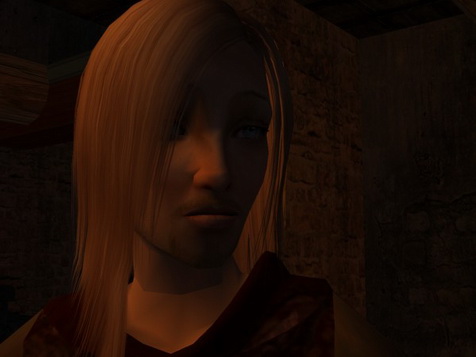
“Now I do.”
Paul licked his lips and hastened to tell before his father changed his mind. “He told me to read the first chapter of the Gospel of John, but he said one verse was the most important: ‘In Him was life; and the life was the light of men. And the light shineth in darkness; and the darkness comprehended it not.’ I think he was talking about Liadan’s nature, because I told him it was like light but not like air.”
“You told him that.”
Paul laughed weakly. “I know you think it indecent…”
“I think it indecent for you to know. I think it unspeakably atrocious of you to speak of it with a stranger.”
“But a priest wouldn’t tell – ”
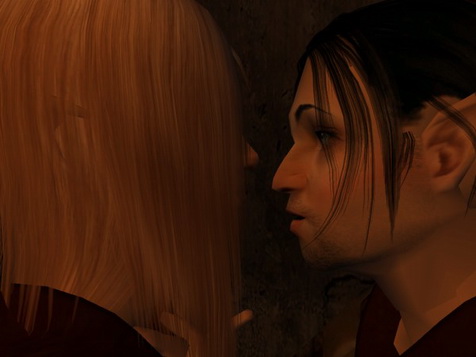
“But he knew. No, Paul. Listen to me now. She is my daughter. My daughter, though my eyes be blue and my ears be pointed. It is no matter who her father was. All that matters is who her father is and will be. And I will not allow anyone to speak her secrets. Not even you.”
Paul shrank away in shame like the little boy that was. Except for his gravest crimes, his gentle father had always sent him to his mother to be scolded. For those gravest crimes, however, his father had spoken as he was speaking now: like the great lord he had been and would be forever. Paul would forever be his little boy.
“He’s dead, anyway,” Paul muttered.
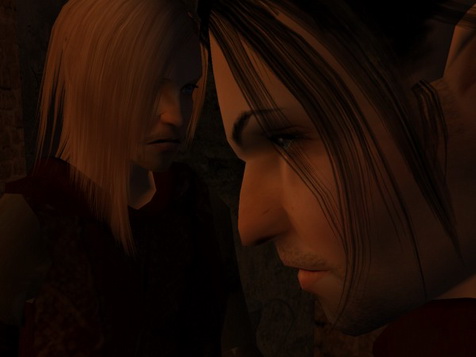
His father only snorted.
When at last Paul dared to peek up from beneath his fringe of blond hair, his father held his eyes for only a moment before turning back to the wall. He laid his hands upon it, bent his head to it; but it was clear even to Paul that whatever he had felt and seen there a short while before was gone, leaving only the dark wall of a dim, gloomy barn.
He turned away, and the great lord too seemed to have vanished. Paul’s mild, gentle father stood in his place, slightly dazed, and with carefully averted eyes.
He said, “Let us go up to see the ladies.”
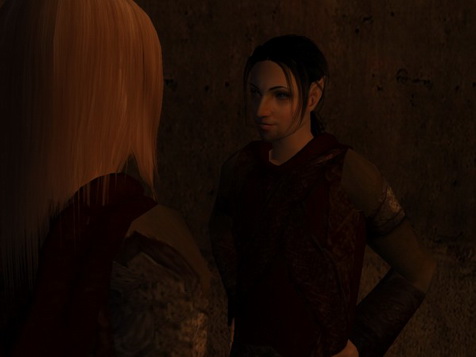






So close to the truth, and yet so far off.
I only hope Araphel will be able to show Flann the truth. I like Osh, really, but not for her, their love is not passionate enough, it has never been, and now they can't even be properly wed...